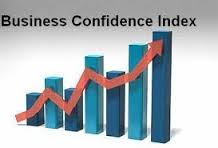The Overseas Investors Chamber of Commerce and Industry (OICCI) shared the results of its Business Confidence Index (BCI) Survey – Wave 14 on May 10, 2017. The survey showed an overall positive Business Confidence Score (BCS) of 13%, a 4% decline over the previous BCS of 17% reported in November 2016 (Wave-13). This is also significantly lower than the highest ever BCS of 36% recorded in a similar survey in April 2016.
In the latest BCI survey, only the services sector has gained in confidence by 4% while the business confidence score of the manufacturing and retail sectors declined by 9% and 4% respectively.
Key factors responsible for the fall in business confidence were the significant drop in capital investment plans for the next six months, as well as an unstable business situation in the region and the country during the past six months. These views of the respondents in the latest survey were mainly due to the continuing challenges in the area of energy, security and government policies, leading to relatively lower demand for products.
The sentiments of the leading foreign investors, represented by OICCI members, who were included in the current survey randomly, also declined by 9% as compared to last November 2016 survey, but with a BCS of 37%, in the April 2017 survey, they continue to maintain significantly more positive sentiments than the remaining respondents. This is a positive indicator for future FDI inflow which can further improve with a proactive settlement of issues of the foreign investors.
Commenting on the BCI results, OICCI President Khalid Mansoor said: “Downward trend in the business confidence, including amongst foreign investors, is very disturbing considering the current improved economic parameters, government focus on improving the energy and security situation, and the positive fallout expected from the ongoing CPEC projects”. He added, “OICCI members are confident that economic managers of the country will analyse key messages coming out of these latest comprehensive sentiments of the business community to take proactive corrective measures to reverse the trend.”
BCS of various business sectors reflect that Financial services (58%), Chemical/Cement (27%), Nonmetallic (23%) and Real Estate (21%) are most booming sectors, whereas Tobacco (-38%), Petroleum (-13%) and Textile (-2%) have emerged as most restrained sectors. The BCS of automobile industry nose-dived from positive 42% in the previous wave to a mere 4% in the latest BCS – wave 14 – survey.
BCS of metro cities of Karachi/Lahore/Islamabad combined, declined and recorded a positive of 10 % only, as compared to 19% in the previous survey, mainly due to falling in BCS of Lahore to a negative 3% from a positive 26% in the previous survey. BCS for Karachi on a standalone basis declined to positive 10% vs 17%, whereas for Islamabad/Rawalpindi it registered a significant improvement and posted a BCS of 33% vs the previous 19%. The BCS of non-metro cities of the four provinces improved to a positive 20%, compared to the 8% recorded in November 2016.
Moving forward, 48% of businesses expect to expand their business in the next six months but with marginally lower growth in sales volume, sales revenue, profits, and RoI. The planned business expansion is significantly more than the 35% who had indicated an expansion of their business in the previous survey. There is, however, a significant drop in terms of intention to make a new capital investment, probably because of concerns over the availability of energy, security and government policies, leading to a relatively lower demand for products.
Whilst drawing attention to the survey results, Khalid Mansoor advised the respective government authorities to “Expedite necessary interventions on critical issues hindering good governance and ease of doing business”. He opined that “Business sentiment is strongly related to governance which needs to be supported by a progressive, transparent, consistent and predictable policy framework.” Khalid Mansoor urged the authorities to “Address the issues of policy implementation, lack of coordination among federal and provincial authorities, tax anomalies and settlement of the long pending tax refunds through proactive engagement with key stakeholders.”
The survey conducted through field interviews in all four provincial capitals, Islamabad and key business towns across the country, is based on feedback from representatives of all the business segments in Pakistan, including retail, and covers roughly 80 per cent Gross Domestic Product of the country.
The OICCI is the collective voice of major foreign investors in Pakistan. The 193 OICCI members, from 35 different countries, has a presence in 14 sectors of the economy and contributes over one-third of Pakistan’s total tax revenue, besides facilitating the transfer of technology and skills and providing employment to a sizeable number of people. Of these, 57 OICCI member companies are listed on the Pakistan Stock Exchange and 50 are associates of the 2016 Global Fortune 500 companies.




